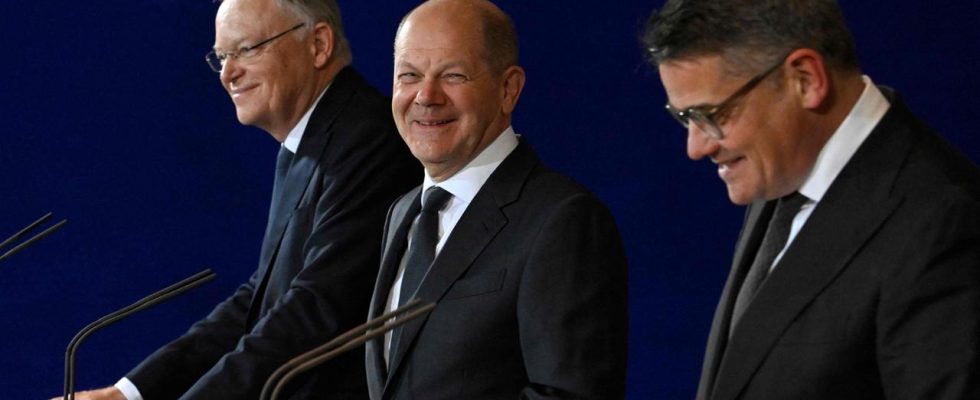It almost looked as if no common ground could be found – then the federal and state governments agreed on key issues regarding migration at their summit. However, questions remain unanswered.
During the course of the day you may have had your doubts as to whether it would still work. But at 2:45 a.m. three good-humoured men appeared in the press room of the Chancellery: Chancellor Olaf Scholz, the Prime Minister of Hesse Boris Rhein and the Prime Minister of Lower Saxony Stephan Weil sang a cheerful “Good morning” in unison to the last remaining journalists.
And everyone who had struggled through the long night was immediately told by Scholz that they hadn’t done it in vain. This is a “historic moment”. Scholz acknowledges that all levels of the state have come together: “Our common goal is to push back irregular migration.”
Subdued euphoria among country leaders
The Hessian Prime Minister and Chairman of the Prime Minister’s Conference, Rhine (CDU), doesn’t sound quite as euphoric. “Of course it could be more from the perspective of a Union Prime Minister,” he says. But he also emphasizes: “We have made a good step forward, we are satisfied with that.”
It was the Union-led states that ensured that the federal-state meeting started around three hours late. Lower Saxony’s Prime Minister Weil called it “not refreshing.” The SPD politician was clearly annoyed that the Union-led states had proposed changes shortly before the meeting in the Chancellery.
Among other things, they wanted to ensure that asylum procedures should also be possible in third countries. They also called for a reduction in benefits for refugees and an end to voluntary admission programs.
In the end a compromise
It is said to have been very lively at the state meeting, with discussions taking place in small groups at times. In the end, it was not possible to agree on a common line, so the Union-led countries went to the crisis meeting in the Chancellery with a statement attached to the minutes.
Delayed and divided: The conditions for an agreement were not the best. But in the end, the Union-led countries no longer insisted on the protocol declaration because the final text now stated that the asylum procedure should be examined in third countries.
The Chancellor had supported the passage, but at the press conference he also emphasized his skepticism: “At the end of the day, you have to find someone who wants to move this forward together with you. It’s not that easy. Besides, there are a lot of things on legal questions, that’s why we agreed to examine it.” Testing does not mean: doing it inevitably. The wording was enough for the Union countries for the time being.
Financing is a key point
The central point of the negotiations was financing anyway. The topic only came up around midnight. The states had previously asked the federal government to contribute more to the asylum costs. “The breathing system” became the term of the press conference. In the future, the states will be paid per asylum seeker: if fewer asylum seekers come, there will be less money. If more come, the federal government will pay more – nothing less than a system change.
The states had demanded 10,500 euros per asylum seeker, but in the end the federal and state governments agreed on 7,500 euros. In addition, states and municipalities should be relieved through a change in the receipt of benefits. For example, the provision in shared accommodation will be offset in the future. In addition, asylum seekers will only be able to receive full social benefits after 36 and not 18 months.
Where does the money come from?
Overall, Lower Saxony’s Prime Minister Weil speaks of a relief of around 3.5 billion euros and praises the agreement with the federal government: “The fact that we have managed to come to the middle under these conditions is really worth an exclamation mark at this early hour of the morning. “
In addition to the exclamation mark, there is also a question mark. How does the state want to finance this? Scholz answers the question pragmatically: “The best thing would of course be that the number of asylum seekers who come to Germany and unsuccessfully apply for protection decreases.” Sounds simple, but remains complicated.

